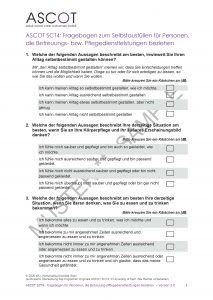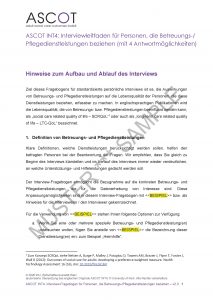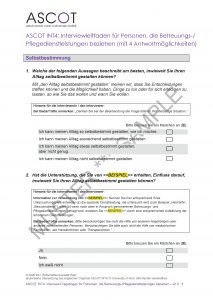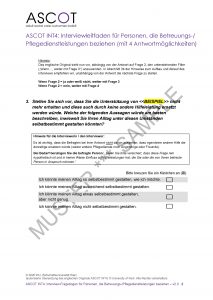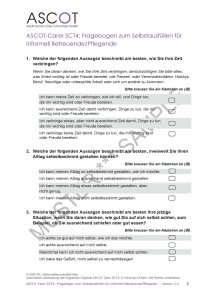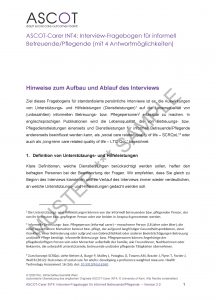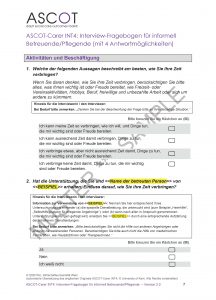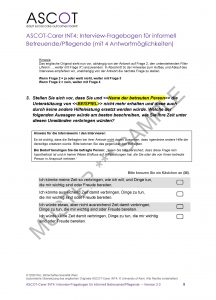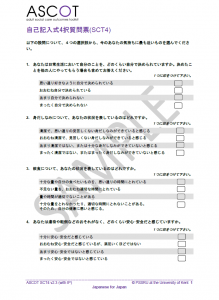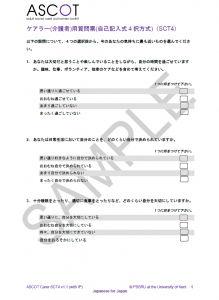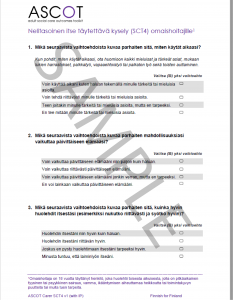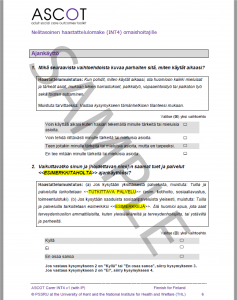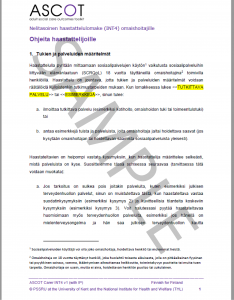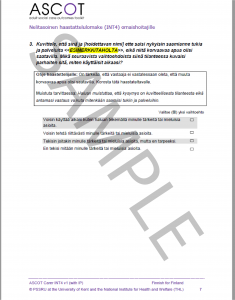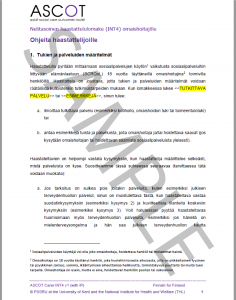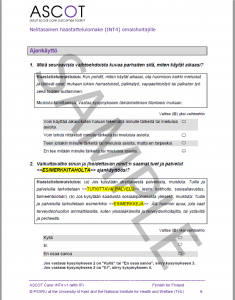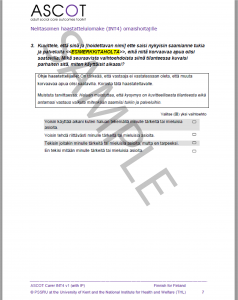ASCOT has generated considerable international interest and ASCOT measures have been cross-culturally adapted and translated into a number of languages.
The ASCOT translations have followed a rigorous methodology in collaboration with the ASCOT team. Therefore, they have the status of approved official translations. Below is a list of the approved translations, with the details of the researchers involved in their development.
ASCOT-SCT4
A Dutch version of ASCOT SCT4 was conducted by a research team at the VU University Amsterdam and the ASCOT team. The Dutch team was led by Karen van Leeuwen, and the team members were Judith Bosmans, Danielle Jansen, Maurits van Tulder, Henriette van der Horst and Raymond Ostelo. The ASCOT team members at the University of Kent, who were involved in the translation, were Dr Stacey Rand, Professor Ann-Marie Towers, Nick Smith and Kamilla Razik. In addition, the Dutch team consulted Birgit Trukeschitz at the Vienna University of Economics and Business (WU).
You can view a sample of the Dutch ASCOT-SCT4 below:
Further details about this ASCOT translation can be found in the key publication below:
- Van Leeuwen K M, Bosmans J E, Jansen A P D, Rand S E, Towers A, Smith N, Razik K, Trukeschitz B, van Tulder M W, van der Horst H E, Ostelo R W (2015) Dutch translation of cross-cultural validation of the Adult Social Care Outcomes Toolkit (ASCOT), Health and Quality of Life Outcomes, 13:56, DOI: https://doi.org/10.1186/s12955-015-0249-x
ASCOT-PROXY
The Dutch translation of the ASCOT-Proxy was conducted by a research team at Leiden University Medical Center (LUMC), from the Department of Biomedical Data Sciences, and the ASCOT team at the University of Kent. The Dutch research team was led by Elske van den Akker-van Marle and Anouk Lamé and involved consultation with Judith Bosmans from the Vrije Universiteit Amsterdam. The ASCOT team members who were involved in the translation were Lizzie Welch and Dr Stacey Rand.
For any questions about the Dutch ASCOT-Proxy tool please contact Elske van den Akker-van Marle directly.
If you would like to licence the Dutch ASCOT-Proxy tool please complete our online licence form here and a member of the ASCOT team at the University of Kent will organise this for you. This is for not-for-profit use and is free of charge. However, if you wish to apply for a licence for the tool to be used for used for-profit, then please fill out this form and a member of the UK ASCOT team will be in touch.
Both the service user version of ASCOT and the carer version have been translated into German: ASCOT (SCT4 and INT4) and ASCOT-Carer (SCT4 and INT4). As part of the EXCELC (“Exploring Comparative Effectiveness and Efficiency in Long-Term Care”) project, the ASCOT team at the WU Vienna University of Economics and Business (Austria) translated ASCOT into German in cooperation with Corporate Translations, Inc., and the ASCOT team at the University of Kent.
The ASCOT team at the WU Vienna University of Economics and Business was led by Dr Birgit Trukeschitz and the team members involved in the translation and/or validation included: Assma Hajji, Judith Kieninger, Judith Litschauer, Tobias Krüse, Adiam Schoch and Meika Sternkopf. The ASCOT team members involved were Dr Juliette Malley, Kamilla Razik and Dr Stacey Rand.
Further information on how to use the German version of ASCOT and on how to obtain a licence can be found on the WU’s ASCOT website in German and in English
Contact: ascot-deutsch@wu.ac.at
If you have any further questions about the German Tools and their development and use in Austria, the key publications to look at are:
- Trukeschitz B, Litschauer J, Hajji A, Kieninger J, Schoch A, Malley J, Rand S, Linnosmaa I & Forder J (2021) Translation, Cultural Adaptation and Construct Validity of the German Version of the Adult Social Care Outcomes Toolkit for Informal Carers (German ASCOT-Carer). Quality of Life Research, 30, (3), 905–920, DOI: https://doi.org/10.1007/s11136-020-02682-4
- Trukeschitz Birgit, Litschauer Judith, Hajji Assma, Kieninger Judith, Schoch Adiam, Malley Juliette, Rand Stacey, Linnosmaa Ismo and Forder Julien (2020) Cross-Cultural Adaptation and Construct Validity of the German Version of the Adult Social Care Outcomes Toolkit for Service Users (German ASCOT). Health and Quality of Life Outcomes, 18:326, 1-19, DOI: http://doi.org/10.1111/hsc.13328
You can view samples of the German versions of the ASCOT instruments by clicking on the pictures below.
ASCOT-SCT4
ASCOT-INT4
ASCOT-Carer SCT4
ASCOT-Carer INT4
ASCOT-SCT4
ASCOT-SCT4 has been translated into Japanese by Corporate Translations Inc in co-operation with a Japanese research team at the Saitama Prefectural University, Koshigaya City, Japan, College of Policy Studies, Tsuda University, Tokyo, Japan, and the National Institute of Public Health at the Department of Health and Welfare Services, Wako City, Japan and the ASCOT team. The Japanese research team was led by Dr Hiromi Nakamura-Thomas: and the team members were Dr Mie Morikawa, Dr Takashi Fukuda, Dr Takeru Shiroiwa, Dr Yoko Moriyama, Dr Takuya Matsushige, Dr Masaaki Otaga, and Dr Makoto Kyougoku. The ASCOT team members involved were Dr Juliette Malley, Kamilla Razik and Dr Stacey Rand. The project was funded by the Japan Society for the Promotion of Science (JSPS), Grants-in-Aid for Scientific Research (KAKEN) C -15K00756 and B – 16H03722 (both in Japanese).
More information about the Japanese ASCOT-SCT4 translation can be found in the key publications below:
- Nakamura-Thomas, Hiromi, Morikawa, Mie, Moriyama, Yoko, Shiroiwa, Takeru, Kyougoku, Makoto, Razik, Kamilla and Malley, Juliette (2019) Japanese translation and cross-cultural validation of the Adult Social Care Outcomes Toolkit (ASCOT) in Japanese social service users. Health and Quality of Life Outcomes, 17 (59). https://doi.org/10.1186/s12955-019-1128-7
- Shiroiwa, T., Moriyama, Y., Nakamura-Thomas, H., et al. Development of Japanese Preference Weight for the Adult Social Care Outcomes Toolkit (ASCOT) SCT4. Value in Health. 21 (S323). https://doi.org/10.1016/j.jval.2018.09.1930
You can view a sample of the Japanese ASCOT SCT4 below:
ASCOT-Carer SCT4
ASCOT-Carer SCT4 has been translated into Japanese by a team led by Dr Mai Yamaguchi, Japan Lutheran College. The team members were Dr Ikushi Yamaguchi, Professor, Meiji University, Dr Machiko Ohara, Professor, Japan College of Social Work, Dr Hiromi Nakamura-Thomas, Professor, Saitama Prefectural University, Dr Akemi Matsuzawa Associate Professor, Ibaraki Christian University and Professor Eiko Horikoshi, Japan Women’s University. The ASCOT team members involved were Dr Stacey Rand and Kamilla Razik. The project was funded by the Japan Society for the Promotion of Science (JSPS), Grants-in-Aid for Scientific Research (KAKEN)-B 16H03715 (in Japanese).
More information about the Japanese ASCOT-SCT4 translation can be found in the key publications below:
- Shiroiwa, T., Nakamura-Thomas, H., Yamaguchi, M. et al. Japanese preference weights of the Adult Social Care Outcomes Toolkit for Carers (ASCOT-Carer). Qual Life Res 31, 2143–2151 (2022). https://doi.org/10.1007/s11136-021-03076-w
- Nakamura H, Yamaguchi M, Rand S (2021) Assessing the structural characteristics of the Japanese version of the Adult Social Care Outcomes Toolkit for Carers. Home Health Care Management & Practice DOI: https://doi.org/10.1177/10848223211030269
- Yamaguchi M and Rand S (2019) ‘Issues and challenges in comparing carers’ quality of life in England and Japan: lessons from developing the Japanese version of the ASCOT-Carer’, International Journal of Care and Caring, 3(3): 459–464, DOI: https://doi.org/10.1332/239788219X15597493546625
You can view a sample of the Japanese ASCOT-Carer SCT4 below:
If you would like to licence any of the Japanese-ASCOT tools please complete our online licence form here and a member of the ASCOT team at the University of Kent will organise this for you. This is for not-for-profit use and is free of charge. However, if you wish to apply for a licence for the tool to be used for used for-profit, then please fill out this form and a member of the UK ASCOT team will be in touch.
ASCOT SCT4 and INT4 and ASCOT-Carer SCT4 and INT4 have been translated into Finnish. The translations were conducted for the Exploring Comparative Effectiveness and Efficiency in Long-term Care (EXCELC) project. Corporate Translations Inc. conducted the work in co-operation with the Finnish research team at the National Institute for Health and Welfare (THL) in Helsinki and the ASCOT team. The Finnish team was led by Professor Ismo Linnosmaa and the team members included: Dr Lien Nguyen, Hanna Jokimäki, Taru Haula and Salla Ikäheimo. The ASCOT team members involved were Dr Juliette Malley and Kamilla Razik and Dr Stacey Rand.
If you are interested in obtaining a copy of the Finnish translation or have any queries, email: finascot@thl.fi
You can find samples of the Finnish versions of ASCOT tools by clicking on the links below:
ASCOT-SCT4
ASCOT-INT4
ASCOT-Carer SCT4
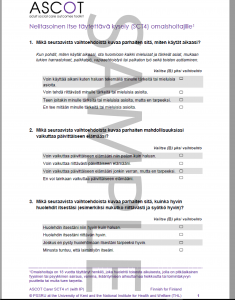
ASCOT-Carer INT4
Further details about this ASCOT translation can be found in the key publication:
Nguyen N, Linnosmaa I, Jokimäki H, Rand S, Malley J, Razik K, Trukeschitz B, Forder J (2021) Social care-related outcomes in Finland. Construct validity, internal consistency, and structural validity of the Finnish ASCOT with older home care users. Health and Social Care in the Community. DOI: http://doi.org/10.1111/hsc.13328
The Spanish version of ASCOT-SCT4 was conducted by a research team at Universidade da Coruña and Universidade de Vigo, and the ASCOT team at the University of Kent. The Spanish research team was led by Professor Eva Rodriguez Miguez and Dr Bruno Casal Rodríguez The ASCOT team members who were involved in the translation were Professor Ann-Marie Towers, Lizzie Welch and Nick Smith.
For further information about the Spanish ASCOT SCT4 please watch this video
Alternatively for any questions about the Spanish ASCOT tool you can contact Bruno Casal Rodríguez/ Eva Rodriguez Miguez or visit their Spanish ASCOT webpage where you will find a sample of the Spanish ASCOT-SCT4 as well as FAQs.
If you would like to licence the Spanish ASCOT-SCT4 tool Please complete Form 2 on this page. This is for not-for-profit use and is free of charge. However, if you wish to apply for a licence for the tool to be used for used for-profit, please fill out this form and a member of the UK ASCOT team will be in touch.
The Swedish ASCOT-SCT4 is a translation and cultural adaptation of the Adult Social Care Outcomes Toolkit (ASCOT) SCT4. This preference-based instrument is designed to measure the social care-related quality of life of the individuals who are receiving long term care. The Swedish version of ASCOT SCT4 was carried out by a research team at the Department of Health, Medicine and Caring Sciences, Linköping University, Linköping, Sweden and the ASCOT team at the University of Kent. The Swedish research team was led by Anna Segernäs and Maria Johansson. The ASCOT team members who were involved in the translation were Lizzie Welch (University of Kent) and Nick Smith (University of Kent).
If you have any questions about the Swedish ASCOT tool you can contact Anna Segernäs or Maria Johansson directly.
If you would like to licence the Swedish ASCOT-SCT4 tool please complete our online licence form here and a member of the ASCOT team at the University of Kent will organise this for you. This is for not-for-profit use and is free of charge. However, if you wish to apply for a licence for the tool to be used for used for-profit, then please fill out this form and a member of the UK ASCOT team will be in touch.
The Chinese ASCOT-SCT4 is a translation and cultural adaptation of the Adult Social Care Outcomes Toolkit (ASCOT) SCT4 into Traditional Chinese. This preference-based instrument is designed to measure the social care-related quality of life of the individuals who are receiving long term care. The Hong Kong (Traditional Chinese) version of ASCOT-SCT4 was conducted by a research team at The Chinese University of Hong Kong and the ASCOT team at the University of Kent. The Hong Kong research team was led by Professor Eliza Lai Yi WONG, and the team members were were Professor Ricard Huan XU, Siyue YU, Annie Wai Ling CHEUNG, and Judy Chu Dik SZE. The ASCOT team members who were involved in the translation were Nick Smith (University of Kent) and Lizzie Welch (University of Kent).
More information about the Chinese ASCOT-SCT4 translation can be found in the key publication below:
Yu, S., Sze, J.C.D., Cheung, A.W.L., Wang, K., Welch, E., Smith, N., Xu, R.H., & Wong, E.L.Y. Translation, cultural adaptation, and content validation of the Hong Kong Chinese version of Self-completion Adult Social Care Outcomes Toolkit (ASCOT-SCT4) for care service users. Health Qual Life Outcomes 23, 57 (2025). https://doi.org/10.1186/s12955-025-02389-5
For any questions about the Hong Kong (Traditional Chinese) ASCOT-SCT4 tool please contact Professor Eliza LY WONG directly, or visit their Chinese ASCOT webpage where you will find more information about the Chinese ASCOT-SCT4.
If you would like to licence the Chinese ASCOT tool, please complete our online licence form here and a member of the ASCOT team at the University of Kent will organise this for you. This is for not-for-profit use and is free of charge. However, if you wish to apply for a licence for the tool to be used for used for-profit, then please fill out this form and a member of the UK ASCOT team will be in touch.
Intellectual property (IP) ownership and access to the translated versions
The ASCOT team at the University of Kent will retain ownership of the translated versions of ASCOT. The team translating the measure will be allowed to use the translation for the purposes specified in their contract with the University of Kent. Upon completion of the translation, the ASCOT team will hold the translation and will update the ASCOT website with the new translation, unless otherwise agreed. Translations will be made available to other teams under the same terms and licencing conditions as the other measures.
Guidance
This guidance will help you understand the processes involved in an ASCOT translation, and should answer any questions you have, but if you still have questions the ASCOT Team will be happy to help. Please contact ascot@kent.ac.uk.
Indicative Costs
As discussed in the guidance above, as well as the fees to the translation company, there is also the costs of the developer (ASCOT Team) review to take into account. This table gives an idea of the these costs based on the complexity of the translation involved.
Applying to translate an ASCOT tool
Anyone interested in translating ASCOT should complete our online licencing form as a first step.
Any translation of ASCOT must be done in consultation with, and with the approval of, the ASCOT team, and a licence is required. Any translations conducted without the approval of the ASCOT Team, and the appropriate licence, will be deemed as a breach of copyright and Intellectual Property.
The copyright holder, the University of Kent, reserves the right to take legal action in such situations.
The ASCOT team is a network of academics. Any enquiries made will go to a central email and we will endeavor to reply to your enquiry within 10 working days.



